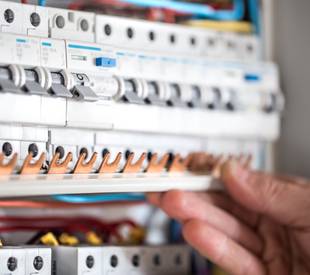As a homeowner, it's important to keep all of the essential components and functions of your home in good working order. One of the key components of your home is the fuse board.
Your home’s fuse board is basically the heart of your electrical system. Its main feature is to keep you safe, so making sure that it’s working properly is very important.
So how do you know it’s working as it should? Here’s all you need to know about your fuse board, as well as the reasons and signs that you should upgrade…
Your Fuse Board Explained
A fuse board, also known as a fuse box, consumer unit or distribution board, is a component of a building's electrical system that distributes power to different circuits throughout the home.
It contains a main switch, which controls power to the entire electrical system, as well as a series of fuses or miniature circuit breakers (MCB) each of which controls power to a specific circuit.
They also protect the wiring and electrical devices from damage due to overloading or short-circuiting.
Where Can I Find My Fuse Board?
It’s important to know where your fuse board is, especially for when something such as the circuit for the lights has tripped. You can typically find it in a cupboard, and it can be located in places like:
- The hallway
- Your porch
- Under the stairs
- In the kitchen
- In the boiler cupboard
- In a box mounted outside the house
- In the garage
It may even be in one of your bedrooms, or in the corner of your living room, possibly in a low down cupboard.
Parts of a Fuse Board
- Main switch – using this switch will turn off the electricity supply to your home. This is usually done in order to stay safe whilst electrical work is done.
- Residual Current Devices (RCD) – this is a safety switch that constantly monitors electric currents in order to automatically switch off electricity if it detects a current flowing down a path it’s not supposed to. It can be life-saving, as it could stop a fatal electric shock when you touch a bare live wire.
- Circuit breakers – these are similar to RCDs, but don’t offer as much protection. They are designed to switch off a circuit if a fault is detected. If a circuit breaker is tripped, you can just reset the switch after identifying and correcting the fault.
- Fuses – you may have these instead of circuit breakers, these work by becoming hot and melting in order to break and disconnect a circuit when a fault flows through them.

Your Local Electrical Specialists
We fix, install, and inspect your electrics without fuss.
Book Your Electrical Check TodayHow Often Should You Get Your Fuse Board Checked?
It definitely helps to keep an eye on things, checking for any signs of issues and contacting an electrician if you experience a problem.
For a home unit, a maximum of getting it checked every ten years is recommended. Getting it checked more frequently is perfectly fine though. You’ll also be required by your mortgage provider to get a check when buying or selling a house.
If you’re renting out a property, a check should be carried out once every five years - in accordance with the Electrical Safety Standards in the Private Rented Sector (England) Regulations 2020. It’s also recommended to get the fuse board inspected in between tenants moving out and new ones moving in.
You may also want to test your RCDs every three months using the ‘test’ button next to the switches. If you do not have RCDs, this is a good reason to upgrade for safety reasons.
Reasons to Upgrade
There are several reasons to upgrade your fuse board…
Safety
One of the most important reasons to get an upgrade is safety of both your home and you/your family. Fuse boards that are particularly old and outdated may not be able to handle the electrical load of modern appliances, leading to a potential fire hazard.
Upgrading could enhance your safety, decreasing the risk of electrical fires and shocks. It will also help to ensure you are complying with regulations.
Convenience
With updating any type of appliance, comes convenience. If you currently have fuses, it’s much easier to reset a circuit breaker than to replace a fuse when an overload happens. And with improved functionality, overloads will be less likely.
Money
Upgrading can help lower your insurance premium as you’re taking steps to improve safety of the home.
A modern and well-maintained system can also increase property value if you think you’ll sell one day. It also helps with the efficiency of your electricity, so could potentially reduce energy costs in the long run.
In any case, it is recommended to upgrade your fuse board every 15 years in compliance with safety standards.
Signs to Look Out For
You may want to upgrade just to improve things but how do you know when you need to upgrade your fuse board? Here are a few signs to look out for:
Faulty Wiring Problems
Faulty wiring can lead to fires, signs of faulty wiring include:
- Flickering or dimming lights
- Slight shock when touching appliances
- Sparking or discoloured power outlets
- Burning smell
If you’ve moved into a new property and noticed any of these, it’s a good idea to contact an electrician.
Frequently Tripped Fuses
If you constantly need to reset tripped fuses, it might mean that your fuse board can’t handle the electrical load in your home and an upgrade is needed to prevent any further problems.
This is especially important with more and more reliance on electricity for laptops, televisions, phone chargers, Wi-fi boxes and so on. An older fuse board may not have been made with this in mind.
Installing New Appliances
When installing large appliances like refrigerators, or treating yourself to something like a hot tub, you need to consider if the fuse board will be able to handle it. Failing to do so will cause constant tripping, as stated above.
Need Advice?
At Able Group we are available 24/7, 365 days a year - specialising in 7 different trades with expert engineers in glazing, locks, plumbing, drains, gas & heating, electrics and pest control.
If you need a repair, upgrade or advice just give us a call on 0330 108 4111






